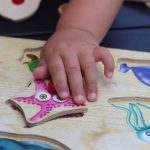
Why Do Toddlers Eat Dirt?
6 min readWritten by Editorial Team


It’s a common concern among parents to witness their toddlers eat mud, chalks, plaster from wall, sand and other such dirt or rather ‘inedible items’. We are aware that such stuff houses a bountiful amount of harmful bacteria, viruses, worms and other parasites. No matter how hard you try to explain, the warning will fall on deaf ears. Your toddler may start putting things in their mouth when no one is looking. You are worried to the core about toxins and bacteria affecting your toddler, whilst your toddler relishes the taste. Read below to find out why toddlers eat dirt and how you can prevent this.
In This Article
- Why do Toddlers Eat Dirt?
- PICA
- Hazards of Eating Dirt for Toddler
- Toxocariasis
- Benefits of Eating Dirt by Toddler
- Ensuring Safe Play in Dirt and Mud
- FAQ’s
Why do Toddlers Eat Dirt?
It is developmentally appropriate for young toddlers to put everything they come across in their mouths. They are exploring, are very curious and their sense of smell and taste leads them to do so. Usually, toddler would defer from eating dirt again if they dislike the taste. However, sometimes it’s not just the taste, but also the texture that tempts toddlers to put things in their mouth. After all toddlers know nothing about bacteria or viruses, they will do things just to please themselves.
As toddlers grow up, this problem resolves on its own paired with your constant guidance. However, this habit becomes a concern when toddler continue to eat dirt and other things during their primary school years. This disorder is called Pica or Geophagy and may be related to nutritional deficiency of calcium, iron or zinc in the body. Malnutrition is another condition which may induce craving for non-food items.
The toddlers develop an irresistible urge to eat these inedible items. Pica is quite common in young children up to the age of 6 and also in pregnant women. For toddlers, this may be an indicator of developmental disorders such as autism.
PICA
Toddlers tend to put various non-food items in their mouths, owing to their curiosity and exploring nature. However, a toddler with Pica would actually tend to have cravings for non-food items, which other toddlers would outgrow with time and age. Between the ages of 1-6 years, 10% to 30% of kids are likely to develop this eating disorder.
The word pica has been derived from the Latin name of a magpie – which is widely known for its strange eating behavior. Pica has been found to be most common in children who have some kind of disability in development – autism, retardation, or even a brain injury. Not only toddlers, Pica can also be a problem for pregnant women and those with epilepsy.
Hazards of Eating Dirt for Toddler

Eating inedible stuff such as hair, sand or bird dropping may lead to gastrointestinal problems. There is an increased risk of such stuff blocking and harming the intestines. Nowadays, the soil is chemically contaminated as it is sprayed with insecticides and pesticides, loaded with bacteria, pet feces and worms. It may lead to various infections and even food poisoning in the toddler. Continuous ingestion may lead to constipation, abdominal pain, vomiting, loss of appetite and diarrhea.
Toxocariasis
A condition which may lead to loss of vision, flare epilepsy or asthma, is caused by Toxacora worms found in the feces of dogs and cats which can easily find their way in soil.
Depending on the surroundings (proximity to factories), the soil may also contain heavy metals such as lead and arsenic. Lead is also found in paint and wood polishes commonly used in the household. Consuming large quantities of lead can damage the nervous system of young children. Arsenic, another harmful toxin can make toddlers more vulnerable to develop cancer. Eating dirt and sand may also lead to the deficiency of iron.
Benefits of Eating Dirt by Toddlers
With too much on your mind about harmful bacteria and viruses, well it’s just one side of the story. So how can eating dirt help? Read below:
1. Develops Immune System
Immune system releases antibodies to fight against external bacteria that are harmful for the body. Off late, a number of auto-immune disorders such as multiple sclerosis, inflammatory bowel syndrome as well as asthma and allergies have picked up their pace. In auto-immune disorder, the body makes antibodies and mistakenly destroys the healthy tissues or may not develop sufficient antibodies to fight infection. The hygiene hypothesis proposes that if immune system is trained, then it may be strengthened and thus increase resistance of the body. For this purpose, practicing in childhood by eating dirt is fine way to develop immunity.
2. Stress on Cleanliness
Another component of this theory holds that with exaggerated stakes on cleanliness, toddler are no more exposed to dirt and if suddenly countered by it, they are very prone to develop allergies. This is because their immune systems haven’t had any experience with fighting bacteria or viruses.
3. Mineral Supplement
Clay or soil is rich in mineral components and may supplement diet in some cases.
4. Probiotic Properties
Soil contains some bacteria which are healthy for your gut. So ingesting these may aid digestive functions. It has also been found to help in curing Crohn’s disease and leaky gut syndrome.
5. Heals Stomach Ache
Kaolin, a substance found in white clay has been used in medicines to heal stomach upsets. Caution: Anything of excess is bad, in this case, too much clay can get you constipated!
It’s interesting to know that some manufacturers used clay-like compounds to some vaccines to increase the immune system’s response. Also in ancient era, food was cooked in clay to protect from toxic alkaloids and tannic acid found in potatoes and bread. Who thought that eating dirt could actually have any benefits?
Ensuring Safe Play in Dirt and Mud

A few tips to ensure safety of your toddler:
- Instead of just sweeping the floor, do wet mopping; preferably added with disinfectant.
- Indulge in dusting – a solid reason to keep your house spic and span! This will prevent your little one from licking dust.
- Make sure there are no chipped paints within the range of your toddler.
- Keep away pencil, eraser, paper, coins and such other small items from your toddler.
- Throw away pebbles, pet poop, stray leaves from your verandah and backyard.
- If you have potted plants, perch them high up on the wall – away from your toddler’s reach.
- If you have a garden, consider fencing it with a gate and make sure you are around your toddler whilst they play outside. It’s best to supervise or play with your toddlers in the garden or if you have a separate sand play area. Infants can get choked by gritty sand. Also, you must advise them against throwing sand in others’ eyes, ears or mouths.
- Keep pet food away from your toddler’s reach, it has been known to cause salmonella infections.
- Also teach your toddlers to wash their hands and mouth after playing in the dirt.
The usual dirt play may be safe, but supervision is necessary. In order to ensure your toddler does not develop these habits, give a balanced diet to your toddler with an increased proportion of calcium, iron and zinc. These can be obtained from meat (esp. red meat), liver, eggs, seafood, grains, cereals, and legumes and dairy products. Consult your pediatrician, who may prescribe supplements. It’s nothing to panic about, this is just a developmental phase and a reminder that your toddler needs your attention and love.
Read Also: Tips To Stop Babies From Putting Everything In Mouth
FAQ’s
1. Why Does My 3 Year Old Love Eating Dirt?
This is the age of curiosity. They are curious about texture, things around them and food. Many children start self feeding at this age and would like to taste everything around them.
2. Does Eating Dirt in Toddlers Indicate a Deficiency?
Not always. If your toddler is above 6 years of age or has started going to school, the awareness must curb the habit. If they still do it without a control, it could be a deficiency.
3. Could Toddler Eating Dirt Indicate a Disorder?
Pica is not an uncommon condition among toddlers and pregnant women. If your child is craving to eat non-food items beyond a “curious” limit, it could be an eating disorder. If you are concerned, check with your doctor who can diagnose accurately.
4. How Can I Control my Toddler From Eating Dirt and Other Non-Edible Items When We go Out?
Toddlers tend to do things we say no to. Always give something for your toddler to hold on to, so that their hands are not free to pick things to eat. If you sense them getting tempted to eat non food items, play a game or do something to distract them without causing a scene.
5. What Age do Kids Stop Eating Dirt?
Usually by the age of two years the kids stop eating dirt. If it continues after that, consult doctor.
6. Does Pica Mean Autism?
Pica does not mean autism. Pica is a disorder which can affect any kid. But yes, children battling with autism are at a higher risk of developing Pica.

Editorial Team,
With a rich experience in pregnancy and parenting, our team of experts create insightful, well-curated, and easy-to-read content for our to-be-parents and parents at all stages of parenting.Read more.
Responses (0)
Want curated content sharply tailored for your exact stage of parenting?
Related articles

Top Tips to Help Your Toddler Dress Themselves

Top Healthy Indian Lunch Ideas For Toddlers(12 to 24 Months)

When Do Toddlers Start Jumping?

Top 7 Preschools in Chennai For 2024-2025

Spatial Awareness in Toddlers – What is it and Activities to Improve

Toddler Milestones – What Can You Expect at 26 Months?
Sponsored content
Discover great local businesses around you for your kids.
Get regular updates, great recommendations and other right stuff at the right time.





